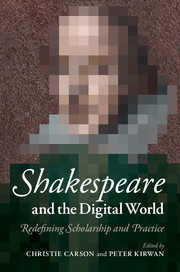Book contents
- Frontmatter
- Contents
- Notes on contributors
- Acknowledgements
- Shakespeare and the digital world
- Part I Defining current digital scholarship and practice
- Part II Defining current digital scholarship and practice
- Half-time: A pause for reflection
- Part III Redefining the boundaries and practices of Shakespeare studies online
- Part IV Redefining the boundaries and practices of Shakespeare studies online
- 14 Changing a culture with the Shakespeare Birthplace Trust
- 15 Developing a digital strategy
- 16 The impact of new forms of public performance
- 17 Creating a critical model for the twenty-first century
- Conclusion
- Index
- References
14 - Changing a culture with the Shakespeare Birthplace Trust
Championing freedom and democracy
Published online by Cambridge University Press: 05 July 2014
- Frontmatter
- Contents
- Notes on contributors
- Acknowledgements
- Shakespeare and the digital world
- Part I Defining current digital scholarship and practice
- Part II Defining current digital scholarship and practice
- Half-time: A pause for reflection
- Part III Redefining the boundaries and practices of Shakespeare studies online
- Part IV Redefining the boundaries and practices of Shakespeare studies online
- 14 Changing a culture with the Shakespeare Birthplace Trust
- 15 Developing a digital strategy
- 16 The impact of new forms of public performance
- 17 Creating a critical model for the twenty-first century
- Conclusion
- Index
- References
Summary
Ever since its foundation around the Victorian purchase and renovation of Shakespeare’s Henley Street home in 1847, the Shakespeare Birthplace Trust has, in at least one sense of the word, been a postmodern organisation. Like its Victorian predecessors, the Trust has its own specialist and unique claims on the past which it re-shapes to suit the shifting tastes of the present. The Shakespeare Birthplace Trust has long stood for a model of education which is based on conversation, careful listening, interaction and the free exchange of ideas, both in lecture and seminar situations as well as in practical workshops. We have long seen ourselves as a meeting place for people from all over the world who are interested in Shakespeare. People can visit the five Shakespeare Houses in and around Stratford-upon-Avon and engage with our courses, events and important collections. In June 2010 we decided to launch a digital platform which embodied our values and which would allow us to engage with many more people than could ever visit Stratford-upon-Avon itself.
Our first social media site, http://bloggingshakespeare.com, caught a developing trend among organisations, bearing out the UK government’s recommendation ‘to put people at the centre of all our digital thinking’ (Department of Culture, Media and Sport, 2009). For us, the question ‘How do we use the web?’ is far less important than the question ‘Why use it at all?’ A chance encounter and conversation after a show in Stratford-upon-Avon with A. J. and Melissa Leon of misfit, inc. (digital experts and ‘professional troublemakers’, http://misfit-inc.com) coincided with the Shakespeare Birthplace Trust wanting to design a new website. Crucially, the decision was taken that our engagement with social media would sit separately from our new website. In critiquing the digital presences of the British Library, the Royal Shakespeare Company, Shakespeare’s Globe and the Shakespeare Birthplace Trust, Kate Rumbold notices a range of activity which Sylvia Morris cites as taking place ‘within the bounds of the institutional website’ (Morris, above 180). But Rumbold’s review predates this change in digital culture which swept through the Shakespeare Birthplace Trust.
- Type
- Chapter
- Information
- Shakespeare and the Digital WorldRedefining Scholarship and Practice, pp. 193 - 201Publisher: Cambridge University PressPrint publication year: 2014
References
- 1
- Cited by



